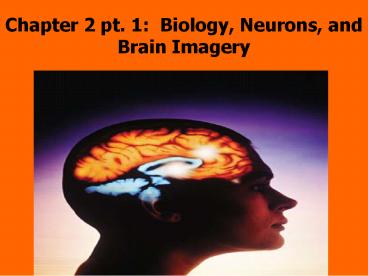Chapter 2 pt. 1: Biology, Neurons, and Brain Imagery - PowerPoint PPT Presentation
1 / 20
Title:
Chapter 2 pt. 1: Biology, Neurons, and Brain Imagery
Description:
Chapter 2 pt. 1: Biology, Neurons, and Brain Imagery Review: What Link Do Biological Psychologists Attempt To Study? Biological Psychologists study the link between ... – PowerPoint PPT presentation
Number of Views:93
Avg rating:3.0/5.0
Title: Chapter 2 pt. 1: Biology, Neurons, and Brain Imagery
1
Chapter 2 pt. 1 Biology, Neurons, and Brain
Imagery
2
Review What Link Do Biological Psychologists
Attempt To Study?
- Biological Psychologists study the link between
- The basic building block of the nervous system is
called the neuron or a nerve cell.
3
Terminal buttons of axon releases
neurotransmitter forms junctions with other
neurons
Neuroanatomy
Dendrites Receive messages from other neurons
Axon Passes messages from cell body to other
neurons
Myelin Sheath Covers and protects the axon
helps speed up neural impulses
4
Action Potential - Brief electrical charge that
travels down axon once neuron is stimulated
(all-or-none response)
Synaptic Gap Fluid filled space between
neurons neurotransmtter highway
Resting Potential Neuron has the ability to
fire neuron is slightly negatively charged
Neural Communication
5
Reuptake
Reuptake The process of the sending neuron
reabsorbing excess neurotransmitters through the
synapse
Refractory Period A neuron cannot fire again
until the cell is recharged
6
Reuptake
Some drugs, such as cocaine, block reuptake,
which leaves the excess neurotransmitters in the
synapse.
This allows them to continue binding with the
receptor sites on the receiving neuron.
7
How is a neuron like a toilet?
8
Types of NeurotransmittersThese Are Tough!!
- 1. Acetylcholine vital role in memory and
muscle contraction - Too much
- Too little
9
Types of NeurotransmittersThese Are Tough!!
- Serotonin affects mood, hunger, and arousal
- Too little
- Dopamine muscle movement and attention
- Too much
- Too little
10
Types of NeurotransmittersThese Are Tough!!
- 4. Norepinephrine helps control alertness and
arousal when you are scared or excited. - Too much thought to be a cause of mania in
bipolar disorder - 5. Endorphins called the morphine within
because of its link to pain control and pleasure.
11
Types of NeurotransmittersThese Are Tough!!
- GABA helps relax and calm down the body.
- Too little
- . Glutamate major excitatory neurotransmitter
(speeds the brain up) - - Too much
12
Agonists vs. Antagonists
- Agonists are chemicals that mimic the effects of
a neurotransmitter (they make the neuron fire)
Ex - Antagonists are chemicals that block the
transmission of a neurotransmitter (they stop it
from firing) Ex
13
The Bodys Nervous System
- Nervous System is your electrochemical
communication center consists of the
1. central nervous system and the nerves within
your 2. peripheral nervous system.
14
2 Divisions CNS vs. PNS
- Central Nervous System (CNS) contains the brain
and spinal cord. - Peripheral Nervous System (PNS) contains the
sensory and motor neurons that connect the CNS to
the rest of the body. Is Divided into Autonomic
and Somatic.
15
Divisions of the Nervous System
16
3 Types of Neurons
- 1. Sensory Neurons neurons that carry info
from the sensory receptors (in the PNS) to the
brain and spinal cord (in the CNS). Also called
Afferent Neurons. - 2. Interneurons neurons within the CNS that
internally communicate between sensory and motor
neurons. - 3. Motor Neurons take information from the CNS
to the muscles and glands within the PNS. Also
called Efferent Neurons.
17
Sensory Neurons
Motor Neurons
18
Sympathetic Reactions
19
Parasympathetic Reactions
20
Automatic ActionsAre Simple Reflexes
- Reflex a simple, autonomic, inborn response to
a sensory stimulus. Spinal cord in charge and
brain NOT involved.































